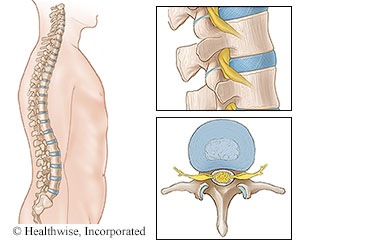
What is medial branch neurotomy?
Medial branch neurotomy is a procedure to help relieve long-term pain. It uses radio waves to damage nerves in your neck or back so they no longer send pain messages.
Medial branch nerves carry many of the pain messages to your brain from the facet joints in your neck and back. These are the joints that connect your vertebrae to each other. Problems in these joints can cause long-term pain.
The doctor will first use a tiny needle to numb the skin. Then the doctor will put the neurotomy needle into the numbed area. You may feel some pressure, but you should not feel pain.
How do you prepare for the procedure?
Procedures can be stressful. This information will help you understand what you can expect. And it will help you safely prepare for your procedure.
 Preparing for the procedure
Preparing for the procedure
- Be sure you have someone to take you home. Anesthesia and pain medicine will make it unsafe for you to drive or get home on your own.
- Understand exactly what procedure is planned, along with the risks, benefits, and other options.
- Tell your doctor ALL the medicines, vitamins, supplements, and herbal remedies you take. Some may increase the risk of problems during your procedure. Your doctor will tell you if you should stop taking any of them before the procedure and how soon to do it.
- If you take a medicine that prevents blood clots, your doctor may tell you to stop taking it before your procedure. Or your doctor may tell you to keep taking it. (These medicines include aspirin and other blood thinners.) Make sure that you understand exactly what your doctor wants you to do.
- Make sure your doctor and the hospital have a copy of your advance directive. If you don't have one, you may want to prepare one. It lets others know your health care wishes. It's a good thing to have before any type of surgery or procedure.
What happens on the day of the procedure?
-
Follow the instructions exactly about when to stop eating and drinking. If you don't, your procedure may be canceled. If your doctor told you to take your medicines on the day of the procedure, take them with only a sip of water.
-
Take a bath or shower before you come in for your procedure. Do not apply lotions, perfumes, deodorants, or nail polish.
-
Take off all jewelry and piercings. And take out contact lenses, if you wear them.
At the hospital or surgery center
-
Bring a picture ID.
-
You may get medicine that relaxes you or puts you in a light sleep. The area being worked on will be numb.
-
The procedure will take 45 to 90 minutes.
Current as of: October 1, 2025
Author: Ignite Healthwise, LLC Staff
Clinical Review Board
All Ignite Healthwise, LLC education is reviewed by a team that includes physicians, nurses, advanced practitioners, registered dieticians, and other healthcare professionals.

